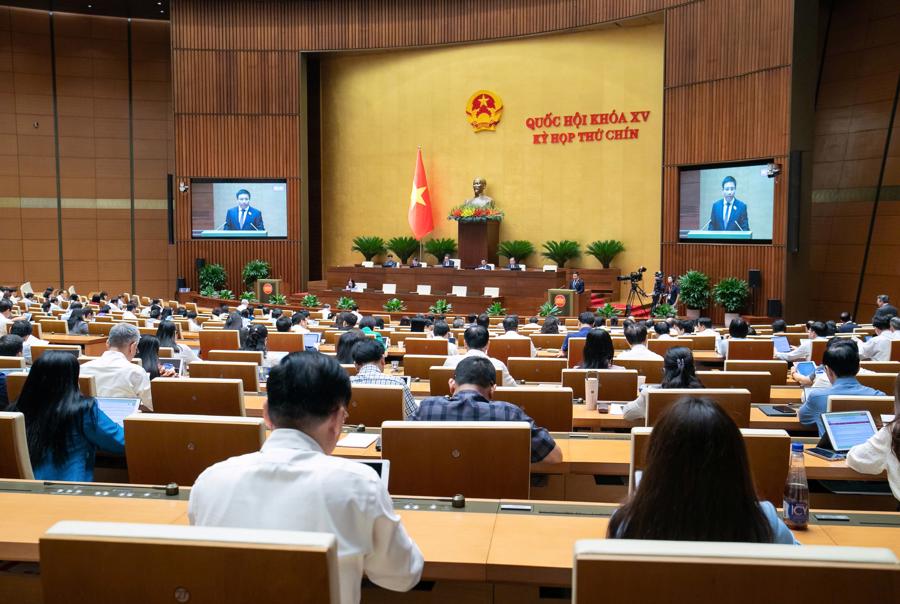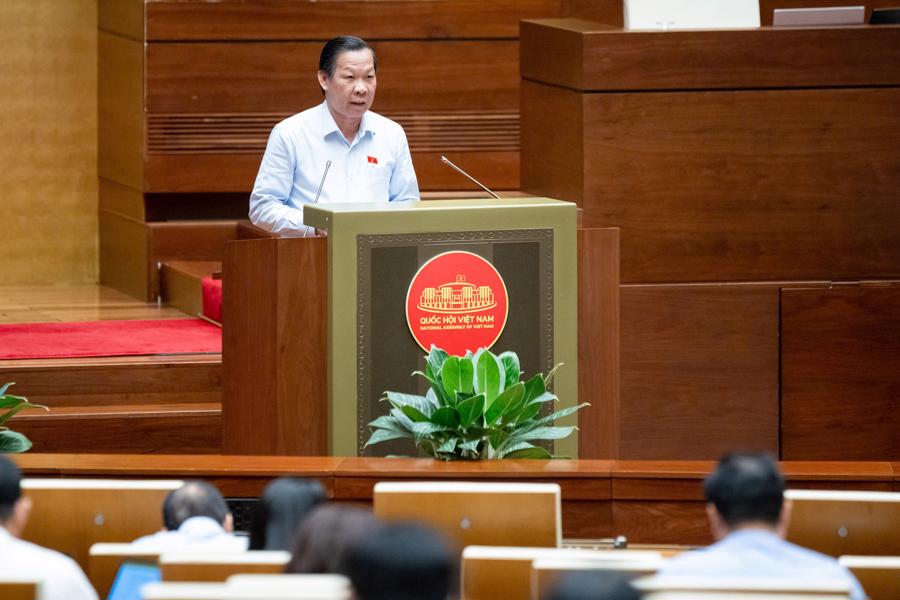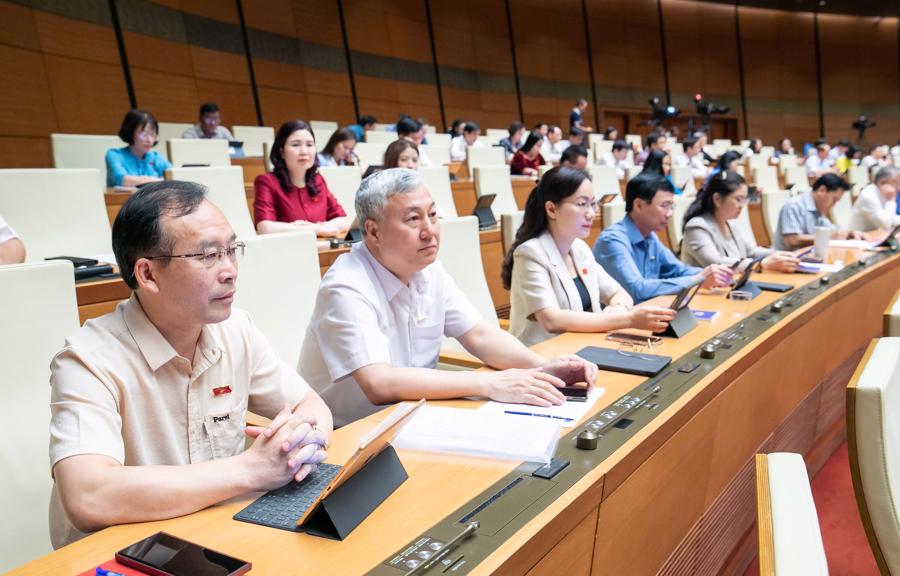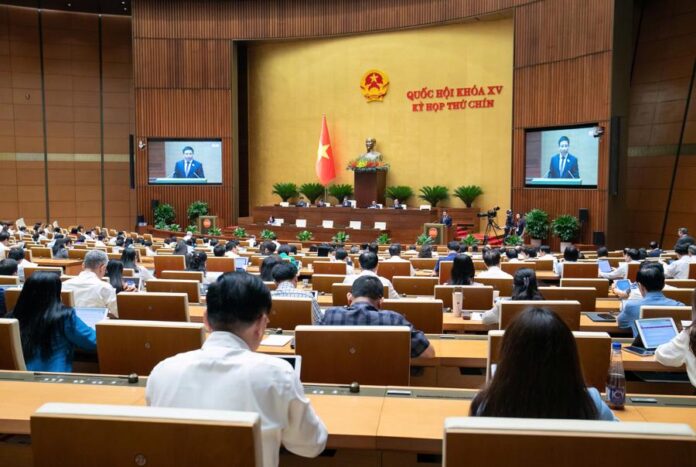Presenting the Government’s proposal, Minister of Finance Nguyen Van Thang stated: “With the evolving socio-economic landscape, laws pertaining to investment, finance, and budgeting have encountered challenges and obstacles in their implementation. Therefore, it is necessary to review and amend these laws to facilitate local government reorganization and promote scientific and technological development, innovation, and national digital transformation to boost economic growth.”
The Government has promptly reviewed, evaluated, and identified seven laws in the fields of investment, finance, and budgeting that require amendments to keep pace with the reorganization of local government structures. These amendments aim to contribute to scientific and technological advancements, innovation, and national digital transformation while enhancing investment, financial, and budgetary support and promoting administrative procedure reform.
Mr. Nguyen Van Thang elaborated on the purpose of the law, stating that it aims to fully institutionalize the Party and State’s guidelines and orientations regarding scientific and technological development, innovation, and digital transformation. It also aims to streamline and reform investment, financial, and budgetary procedures, providing timely solutions to difficulties and obstacles and ensuring efficient utilization of resources for economic development, scientific and technological advancement, innovation, and national digital transformation.
The law amends and supplements several articles in seven existing laws, including the Law on Bidding; Law on Investment in the Form of Public-Private Partnership; Law on Customs; Law on Export and Import Taxes; Law on Investment; Law on Public Investment; and Law on Management and Use of Public Assets.
According to Minister Nguyen Van Thang, the amendments do not entail new administrative procedures and, therefore, do not require additional human resources for implementation. The policies, once the law is passed and promulgated, will be enforced by the agencies and organizations within its scope, without necessitating an expansion of the organizational apparatus or personnel and without impacting the opportunities, conditions, capabilities, rights, or interests of either gender.
The financial resources required to enforce the law will be balanced from the central budget, local budgets, and other legal financial sources in accordance with the Law on State Budget.

Presenting the verification report on the bill, Chairman of the Committee for Economic and Financial Affairs Phan Van Mai stated that the Committee agreed with the necessity to amend and supplement the laws, as presented by the Government, based on political, legal, and practical grounds.
The Committee for Economic and Financial Affairs requested that the Government direct relevant agencies to carefully review and closely monitor the objectives of the law amendments. They should focus on amending and supplementing urgent content to address practical difficulties and obstacles, especially in the field of scientific and technological activities, while ensuring convenient and transparent procedures for enterprises, organizations, and individuals, coupled with efficient and transparent post-inspection management to prevent policy abuse.

Regarding amendments to the Law on Bidding, the bill proposes to allow investors and authorized persons to choose the method of selecting contractors and investors based on the scale, nature, and actual conditions of the package or project. The Committee expressed concern that while this proposal could reduce the time for budget-using units, it might also create conditions for favoritism, policy exploitation, and narrow-scope contract awarding or designation for certain enterprises or affiliated businesses, making it difficult for small and medium-sized enterprises to access public procurement and participate in public investment projects.
Therefore, the Committee requested the Government to carefully assess the policy’s impact and provide a clear report on the political and practical basis for the National Assembly’s consideration and decision.
Concerning amendments to the Law on Investment in the Form of Public-Private Partnership, the Government proposed removing the restriction on applying the direct fee collection model from users for PPP projects and not requiring the guarantee of users’ choices in the case of upgrading and modernizing the existing road infrastructure or operating the upgraded road as a highway. The Committee recommended that the Government carefully consider this proposal and provide a comprehensive impact assessment, ensuring a balance between the interests of the State, enterprises, and citizens in the draft law.

The bill also proposes amendments to address difficulties faced by BOT projects in the road sector with contracts signed before the Law on PPP 2020 took effect.
The Committee requested the Government to carefully review and ensure a solid political basis for these amendments, applying them only to projects where difficulties and obstacles arise due to state responsibility. Strict conditions should be met to ensure clarity, consistency, transparency, and prevent policy loopholes.
Regarding amendments to the Law on Public Investment, Chairman Phan Van Mai shared that the majority of the Committee agreed to add two new contents: “policies for special public investment projects” and “tasks for land clearance preparation.” These additions aim to meet the practical demands in a timely manner.
The Committee also proposed that the Government provide specific regulations to ensure the unity of the legal system and review the provisions to ensure consistency and align project capital allocation with the state budget’s capacity.
On amendments to the Laws on Customs, Export and Import Taxes, Investment, and Management and Use of Public Assets, the Committee agreed with the proposed revisions, focusing on preferential treatment for science, technology, innovation, and digital transformation. They requested the Government to direct a thorough review of specific regulations to ensure tightness and strengthen monitoring mechanisms and risk management to prevent policy abuse. They also suggested continuing to review the provisions on decentralization and delegation to align with the Party’s new guidelines and ensure consistency with relevant laws.
“Streamlining Red Tape: A Firm Commitment to Slash Burdensome Bureaucracy for Citizens and Businesses.”
“Prime Minister Pham Minh Chinh emphasizes the importance of technological and digital transformation, urging that it goes hand-in-hand with administrative reform. He stresses the need to eliminate redundant procedures, engage the private sector, and enhance modern governance across the entire system.”
Reviewing and Allocating Over $430 Million for Land Clearance of the Ho Chi Minh City’s Ring Road 4 Project through Dong Nai Province
The proposed Vành Đai 4 (Ring Road 4) project in Ho Chi Minh City, stretching across 47 kilometers of Đồng Nai, presents a substantial financial undertaking. With an estimated cost of over 10,000 billion VND required solely for land clearance, this endeavor underscores the magnitude of investment needed to pave the way for this ambitious road development project.
The Great Banking Shake-Up: A Necessary Evolution.
Amid the ongoing wave of job cuts across many banks, Dr. Chau Dinh Linh, a finance expert from Ho Chi Minh City University of Banking, shared his insights with the Bank Times correspondent. He asserted that this strategic move is a well-planned step for banks to realign their operations and meet the evolving demands of the new economic landscape.
Proposed Establishment of the Free Trade Area in Haiphong
The Free Trade Area in Hai Phong City will boast a range of mechanisms and preferential policies to attract investment. With its strategic location and well-developed infrastructure, this dynamic zone is set to become a thriving hub for businesses, offering a plethora of incentives to those seeking to establish their footprint in this vibrant economy.





















